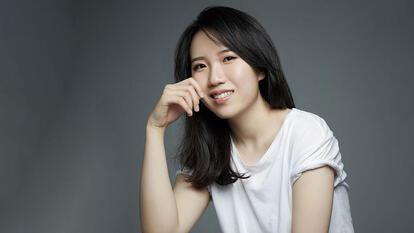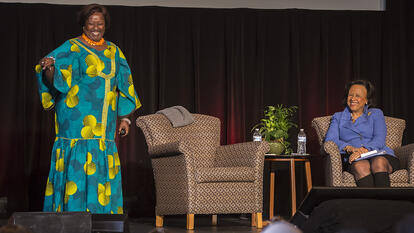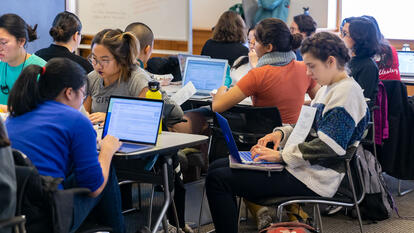On National First-Generation Day, Wellesley Celebrates First-Generation Members of the Community

On November 8, colleges and universities across the country will celebrate their first-generation students, faculty, and staff. Wellesley is hosting a series of events recognizing the vital role first-generation community members play on campus.
The Daily Shot asked Rebecca Garcia, class dean and adviser to Wellesley First, how the College helps first-generation students understand their many academic, career, and social opportunities.
Q: What are the goals of Wellesley First?
Rebecca Garcia: Wellesley First is working to link together many of the existing efforts that support first-gen students from underrepresented groups and those from under resourced backgrounds. We want to increase the retention of students in STEM; ensure students have meaningful learning experiences outside the classroom; increase positive self-efficacy and commitment to health and wellness; and ensure the obstacles to obtaining a college degree are removed. Ultimately, we want students to know they are part of a community that cares about their success and their day-to-day experiences on campus.
Q: Why is it so important to make sure our first-generation students have access to these resources?
Garcia: As a first-gen student, it can be challenging figuring out what you need, not to mention what resources are available. We would like to guide students early on in their academic journey to recognize the various resources available at Wellesley and to integrate them into their overall college experience. If a first-generation first-year student desires to major in STEM and has an interest in graduate school, we want students to know there is thoughtful support for that trajectory.
Q: Admission, Student Life, several academic departments, Career Education and the Office of the Provost are among the campus organizations working together to see to it that first-generation students feel supported at Wellesley. What’s your advice to faculty, staff, and students who want to help empower them?
Garcia: It’s important to help students remember the challenges they have already overcome just to get here. Once here, many continue to compare themselves to their peers well past their first year and focus on the skills or information they lack, instead of the strengths they possess. Teaching them to keep a growth mindset attitude in college is crucial for lifelong success.
Q: What role does mentorship play in the new Wellesley First model?
Garcia: Mentorship is an essential component of these programs. We know it plays a significant role in the positive development of self-efficacy, whether you are a first-year, STEM major, or on the path to applying to graduate school.
Q: What do you wish the Wellesley community knew about our first-generation students, faculty, and staff?
Garcia: While every story is unique, first-gen individuals recognize early on that receiving their college degree is not only about them but also about the families and communities they represent. It is a great honor as well as a great weight to bear daily. You typically don’t hear them boast about all they have done and do.
Q: What are Wellesley First’s next steps?
Garcia: We see an opportunity for innovative programs and fostering an overall sense of community. We hope to continue to identify campus partners that are committed to ensuring first-gen students, students from underrepresented groups, and those from under resourced backgrounds thrive on campus.
Photo: First-generation Wellesley students chat with friends outside of the class deans office located in Scheinder Hall. Students clockwise from left: Abeer Dhanani '20, Shruki Ali '21, Olivia Massie '22, Maria Gonzalez '19, Dayna De La Cruz '21, Aislinn Diaz '19, and Ashley Parra '19



